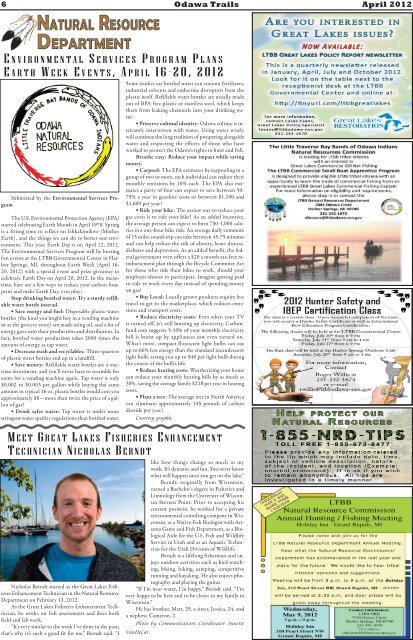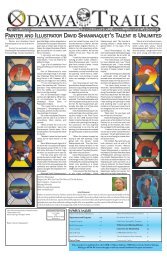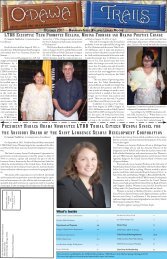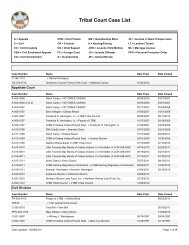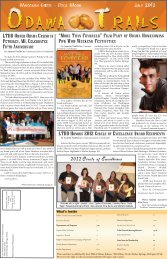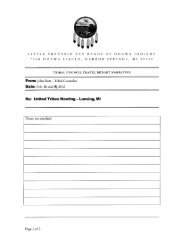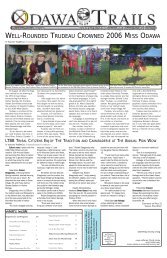April - Little Traverse Bay Bands of Odawa Indians
April - Little Traverse Bay Bands of Odawa Indians
April - Little Traverse Bay Bands of Odawa Indians
Create successful ePaper yourself
Turn your PDF publications into a flip-book with our unique Google optimized e-Paper software.
6 <strong>Odawa</strong> Trails<br />
<strong>April</strong> 2012<br />
E NVIRONMENTAL S ERVICES P ROGRAM P LANS<br />
E ARTH W EEK E VENTS, APRIL 16-20, 2012<br />
Submitted by the Environmental Services Program<br />
The U.S. Environmental Protection Agency (EPA)<br />
started celebrating Earth Month in <strong>April</strong> 1970. Spring<br />
is a fitting time to reflect on Ishkakimikwe (Mother<br />
Earth), and the things we can do to better our environment.<br />
This year, Earth Day is on <strong>April</strong> 22, 2012.<br />
The Environmental Services Program will be hosting<br />
fun events at the LTBB Governmental Center in Harbor<br />
Springs, MI, throughout Earth Week (<strong>April</strong> 16-<br />
20, 2012) with a special event and prize giveaway to<br />
celebrate Earth Day on <strong>April</strong> 20, 2012. In the meantime,<br />
here are a few ways to reduce your carbon footprint<br />
and make Earth Day, everyday:<br />
Stop drinking bottled water: Try a sturdy refillable<br />
water bottle instead.<br />
• Save energy and fuel: Disposable plastic water<br />
bottles (the kind you might buy in a vending machine<br />
or at the grocery store) are made using oil, and a lot <strong>of</strong><br />
energy goes into their production and distribution. In<br />
fact, bottled water production takes 2000 times the<br />
amount <strong>of</strong> energy as tap water.<br />
• Decrease trash and recyclables: Three-quarters<br />
<strong>of</strong> plastic water bottles end up in a landfill.<br />
• Save money: Refillable water bottles are a onetime<br />
investment, and you’ll never have to scramble for<br />
coins for a vending machine again. Tap water is only<br />
$0.002 to $0.003 per gallon while buying the same<br />
amount in typical 16 oz. plastic bottles would cost you<br />
approximately $8—more than twice the price <strong>of</strong> a gallon<br />
<strong>of</strong> gas!<br />
• Drink safer water: Tap water is under more<br />
stringent water quality regulations than bottled water.<br />
Nicholas Berndt started as the Great Lakes Fisheries<br />
Enhancement Technician in the Natural Resource<br />
Department on February 13, 2012.<br />
As the Great Lakes Fisheries Enhancement Technician,<br />
he works on fish assessments and does both<br />
field and lab work.<br />
“It’s very similar to the work I’ve done in the past;<br />
that’s why it’s such a good fit for me,” Berndt said. “I<br />
Some studies say bottled water can contain fertilizers,<br />
industrial solvents and endocrine disruptors from the<br />
plastic itself. Refillable water bottles are usually made<br />
out <strong>of</strong> BPA-free plastic or stainless steel, which keeps<br />
them from leaking chemicals into your drinking water.<br />
• Preserve cultural identity: <strong>Odawa</strong> culture is intricately<br />
interwoven with water. Using water wisely<br />
will continue the long tradition <strong>of</strong> prospering alongside<br />
water and respecting the efforts <strong>of</strong> those who have<br />
worked to protect the <strong>Odawa</strong>’s rights to hunt and fish.<br />
Breathe easy: Reduce your impact while saving<br />
money.<br />
• Carpool: The EPA estimates by carpooling in a<br />
group <strong>of</strong> two or more, each individual can reduce their<br />
monthly emissions by 10% each. The EPA also estimates<br />
a party <strong>of</strong> four can expect to save between 50-<br />
75% a year in gasoline costs or between $1,100 and<br />
$1,600 per year!<br />
• Ride your bike: The easiest way to reduce your<br />
gas costs is to ride your bike! As an added incentive,<br />
the average person can expect to burn 750-1,000 calories<br />
in a one-hour bike ride. An average daily commute<br />
<strong>of</strong> 15 miles round-trip can take between 45-75 minutes<br />
and can help reduce the risk <strong>of</strong> obesity, heart disease,<br />
diabetes and depression. As an added benefit, the federal<br />
government even <strong>of</strong>fers a $20 a month tax-free reimbursement<br />
plan through the Bicycle Commuter Act<br />
for those who ride their bikes to work, should your<br />
employer choose to participate. Imagine getting paid<br />
to ride to work every day instead <strong>of</strong> spending money<br />
on gas!<br />
• Buy Local: Locally grown products require less<br />
travel to get to the marketplace, which reduces emissions<br />
and transport costs.<br />
• Reduce electricity costs: Even when your TV<br />
is turned <strong>of</strong>f, it’s still burning up electricity. Carbonfund.com<br />
suggests 5-10% <strong>of</strong> your monthly electricity<br />
bill is burnt up by appliances not even turned on.<br />
What’s more, compact florescent light bulbs can use<br />
up to 66% less energy than the standard incandescent<br />
light bulb, saving you up to $40 per light bulb during<br />
the course <strong>of</strong> the bulb’s life.<br />
• Reduce heating costs: Weatherizing your home<br />
can reduce your monthly heating bills by as much as<br />
30%, saving the average family $218 per year in heating<br />
costs.<br />
• Plant a tree: The average tree in North America<br />
can eliminate approximately 145 pounds <strong>of</strong> carbon<br />
dioxide per year!<br />
Courtesy graphic.<br />
M EET G REAT L AKES F ISHERIES E NHANCEMENT<br />
T ECHNICIAN N ICHOLAS B ERNDT<br />
like how things change so much in my<br />
work. It’s dynamic and fun. You never know<br />
what will happen once you get on the lake.”<br />
Berndt, originally from Wisconsin,<br />
earned a Bachelor’s degree in Fisheries and<br />
Limnology from the University <strong>of</strong> Wisconsin-Stevens<br />
Point. Prior to accepting his<br />
current position, he worked for a private<br />
environmental consulting company in Wisconsin,<br />
as a Native Fish Biologist with Arizona<br />
Game and Fish Department, as a Biological<br />
Aide for the U.S. Fish and Wildlife<br />
Service in Utah and as an Aquatic Technician<br />
for the Utah Division <strong>of</strong> Wildlife.<br />
Berndt is a lifelong fisherman and enjoys<br />
outdoor activities such as bird watching,<br />
biking, hiking, camping, competitive<br />
running and kayaking. He also enjoys photography<br />
and playing the guitar.<br />
“If I’m near water, I’m happy,” Berndt said. “I’m<br />
very happy to be here and to be closer to my family in<br />
Wisconsin.”<br />
He has brother, Matt, 29, a sister, Jessica, 24, and<br />
a nephew, Cameron, 2.<br />
Photo by Communications Coordinator Annette<br />
VanDeCar.


